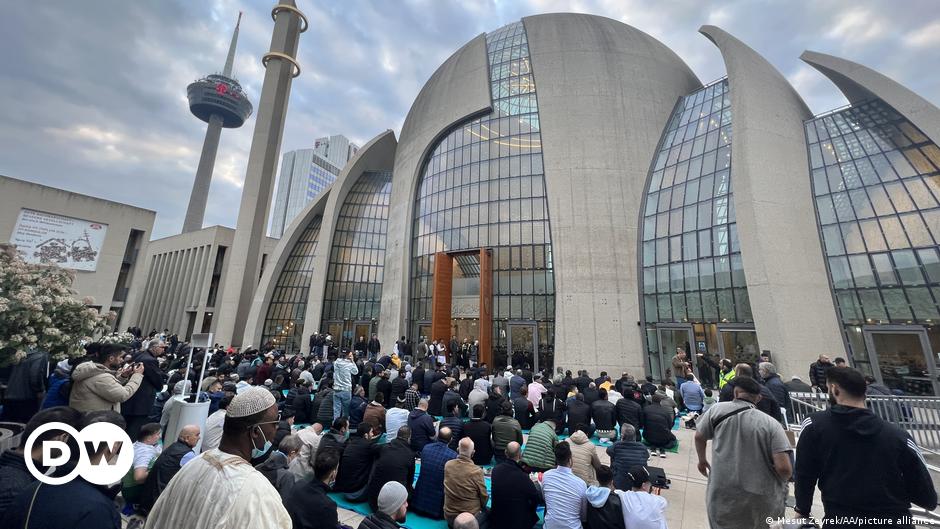Germany’s largest mosque will broadcast the call to prayer for the first time on Friday.
It comes as part of an agreement between the Central Mosque of Cologne and the city authorities.
“We’re very happy,” Abdurrahman Atasoy, general secretary of the Turkish government’s religious affairs authority in Germany, DITIB, which runs the mosque, said.
“The public call to prayer is a sign that Muslims are at home here,” he added.
Cologne mayor Henriette Reker said allowing the call to prayer was “a sign of respect” for the city’s many Muslims.
Cologne has more than 100,000 Muslim residents.
Mosque to comply with strict limits
Mosques in several cities in Germany have long been authorized to broadcast the call to prayer, but Cologne only approved it late last year.
The large mosque in the Ehrenfeld district will be the first in the city to send out the muezzin call to Friday Prayers. Other mosques in the city have also expressed interest in taking part in the two-year pilot project.
Under the agreement, Cologne’s Central Mosque will be allowed to send out a single call to prayer over loudspeakers for up to five minutes on Fridays, between noon and 3:00 pm. The volume cannot exceed 60 decibels.
-
-
Cologne’s central mosque: A troubled symbol of unity
Inspired by a flower bud
The building was designed with glass walls and a staircase accessible from the street, symbolizing openness to people of all religions. It features two 55-meter (60-yard) minarets and a dome of glass and concrete which appears to open like a flower bud.
-
-
Cologne’s central mosque: A troubled symbol of unity
Ehrenfeld’s mix of cultures
The mosque is located in Cologne’s Ehrenfeld district, a formerly a working-class quarter. Ehrenfeld suffered a rise in unemployment and poverty when factories closed in the 1970s. Some time later, however, low rent prices lured in artists, galleries and theaters, ultimately gentrifying the area. Today, 35 percent of locals there have an immigrant background.
-
-
Cologne’s central mosque: A troubled symbol of unity
Impressive plans
The construction was funded by hundreds of Muslim associations, but also bank loans and donations from the Turkish government’s religious affairs authority in Germany, DITIB. Cologne city council approved the plans in 2008, despite Chancellor Angela Merkel’s party, the conservative Christian Democrats, voting against it.
-
-
Cologne’s central mosque: A troubled symbol of unity
Architect drops out after row with Turkish association
Architect Paul Böhm, who specializes in building churches, won the contract in 2005. He saw the building as an act of integration. He later fell out with the new leadership of DITIB and stopped working on the project in 2011.
-
-
Cologne’s central mosque: A troubled symbol of unity
Doors opened in 2017
The mosque first opened for prayer during Ramadan in 2017, but was only officially opened by Turkish President Recep Tayyip Erdogan during his visit to Germany in September 2018.
-
-
Cologne’s central mosque: A troubled symbol of unity
Room for 1,200 worshippers
Inside the mosque, there’s a prayer area which takes up both the ground and the upper floor, with the two sections connected by a well in the center of the building’s glass front. The compound houses an Islamic library. There are also shops and sports facilities intended to foster interactions among people of different faiths.
-
-
Cologne’s central mosque: A troubled symbol of unity
New skyline
Some residents were shocked by the sheer size of the construction when the plans were first presented, especially the height of the minarets, and feared a change in the skyline of their “Christian city.” Then-Cardinal Joachim Meisner, the archbishop of Cologne, admitted to having “an uneasy feeling” about the project.
-
-
Cologne’s central mosque: A troubled symbol of unity
Right-wing protesters oppose the mosque
Right-wing politicians picked up on the sentiment and launched a heated debate about the integration of Muslims in Germany. Author Ralph Giordano said the mosque would be “an expression of the creeping Islamization” in the country.
-
Cologne’s central mosque: A troubled symbol of unity
Imams or spies?
In 2017, German authorities launched an investigation into the activities of DITIB imams, who are schooled in Turkey and paid by the Turkish state, as well as other people working in the Cologne complex. Mosque employees were suspected of spying against Turks living in Germany on behalf of the Turkish goverment.
Author: Rina Goldenberg
Controversy over mosque’s funders
Cologne’s Central Mosque has been a flashpoint for anti-Muslim sentiment in the past and it has been denounced particularly over the involvement of DITIB.
Critics have accused the organization of spying on Turkish dissidents living in Germany.
Turkish President Recep Tayyip Erdogan formally inaugurated the Mosque himself during a controversial visit to Germany in September 2018.
Murat Kayman, who serves on the advisory board of the Alhambra Society, an association of liberal Muslims, welcomed the fact that the muezzin call was possible but he warned DITIB “stands for everything, but not for democratic conditions and freedom.”
lo/rt (AFP, EPD)
Source: DW












